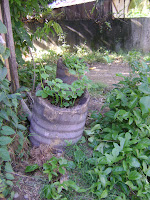In this community where we live only few people read books and only few show some interest to the library project. Having many books seems absurd and useless since there’s not much borrower so sometimes we organize gigs and different kinds of gathering just to promote the books, spread reading culture, or just simply invite more visitors. I still remember the excitement we had before when we were just collecting those books or starting the community library project; it was totally electrifying and wonderful. Our categories are consist of diverse issues ranging from sociology, history, philosophy, ecology and radical environmentalism, positive psychology, spirituality and transcendence, esoteric studies and religion, science and technology, race, gender, politics and many fiction and poetry collection. These issues are overwhelming but we strive our ways to make everything balance, cultivate our self-reflection, and maintain the mental and spiritual health. So in the midst of all chaos, anxiety, confusion, insecurities and alienation we pursued to have this vision actualized. Being in a place where intellectual stimulation is valued and can be easily practiced, where the past, the present, and the future meets, and where all aspects of humanity and life is being analyzed and being defined, reasons and inspirations are constantly flowing and spreading. In the heart of a lazy and apathetic society where gambling and other nonsensical matters are more important than knowledge and creativity, we decided to form a book club, organized book swaps and Really Really Free Market, semi-book fest, poetry readings, and library parties. Through this we’ve met many people, made a lot of friends, and lost many books (but we don’t look at it as loss). But living here is not only about being a self-styled librarian, we are also struggling with many different ideals, old or new, that are counter-intuitive and provocative to the norms that brought us up in our individual homes.
Living collectively is not easy especially when you’re not ready to leave those comfort zones inside your head. There would be too much pressure, various sensitivities that you need to consider. Patriarchy, authoritarianism, sexism, consent, consensus, physical and mental space, individual differences and choices, etc. Trying to be politically correct all the time is impossible and perhaps a ridiculous action, but perpetuating the patterns of oppression is not cool either. So we walk the talk, practice what we preach, dismantle the role, shatter the myth, rotate the tasks, resist oppression internally, fight the powers “inside the house”, do the revolution, and disobey the law. Meaning we deconstruct important issues such as nuclear family setting, female role and the power of male gender, conflict and resolution, bullying, dishonesty, etc. and tried to be sensitive, inclusive, responsive, productive and effective. We politicized ourselves and practice the best things we prefer and maintain the existence of “revolution” or just simply “change” and tried to live harmoniously. So here boys wash clothes and dishes, cook food, clean the kitchen, and water the plants.
Unlike in most houses where often males do the decision making, ours is a place where both ideas are encouraged, valued and considered. In terms of consumption or how do we behave as consumers (this is tricky!), I can say there were many times we violated our conscience but in our day to day living in general, we tried to avoid using so much stuff or buying too much. We usually avoid buying food in plastics, in cans and other non-biodegradable wrappers. We also avoid using too much shampoo, toothpaste or soap and we don’t buy soft drinks, perfumes, deodorants, etc. We also don’t eat at Mcdonalds or Jollibee or any of those crazy stuff advertized in the TV. Again, I’m not saying we totally avoided these things but what I’m trying to explain here is that we are conscious and eager for environmental sustainability and social empowerment ans so we are trying/willing to sacrifice our addictions for the sake of a healthy and humane future. I realized to write down all these because I wanted to see the things that are essential for our collective growth; through deconstruction and comparison to wherever houses that I visited, I can identify the differences and similarities. Almost everywhere you go today, at any age, these things are very rampant and dominant. People are pathetically being conditioned to endless irresponsibility and ignorance; being indifferent is normal and there’s no room for intellectual, sincere, responsive or productive social interaction. That is why I am proud to be in this situation because in this place where we live, consciousness and sensitivity to these issues are being cultivated and improved for the collective progress and psycho-social health.
In the past four years our life in this place was fair enough; we are happy because of so many wonderful experiences that we had here. We met many people from different parts of the world especially activists or at least people who are already conscious and politicized. We shared visions, aspirations, ideas, food, money, bed and we sing, dance, cook, swim, go to concerts, and sometimes get drunk together. We’ve learned so many important things from them that opened up new and exciting doors to life. Sometimes, some of these things spark another stories and new beginnings, driving on our motivations intensely and lifted us to a higher ground, the higher truth and realms of our spiritual journey in this sleeping society. In connection to gardening, I cannot forget the times that I shared with our volunteers. These times are more valued because most of them became our good friends, even though we only been together for a very short time. Spending three hours at the garden talking about each other’s experiences and perspectives is a great catalyst for a relationship temporarily dissolving the boundaries of time and space. We explore each other’s value while mutually teaching each other on different ways and preferences and through this, the power of communication and skills add strengths to the SG vision and dedication.

















